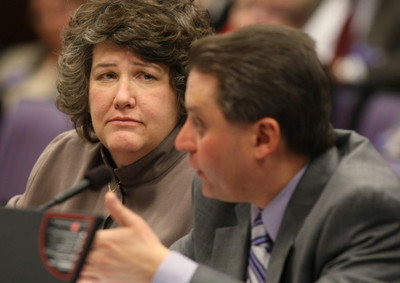Open meeting held on tax plan

CARSON CITY — After months of discussion of everything but, the Legislature finally started talking taxes Thursday.
A proposal to increase taxes on businesses’ payrolls over $250,000, backed by Assembly Speaker Barbara Buckley, D-Las Vegas, was the first major tax proposal on the table as legislators look to balance the budget for the next two years.
The proposal had its first hearing Thursday afternoon in a joint tax committee of the Assembly and Senate. The committee expects to hear more tax proposals in the coming days as lawmakers rush to get a tax package on the desk of Gov. Jim Gibbons by next Thursday.
Under the plan, three-quarters of the state’s businesses would get a tax cut.
The state tax on non-financial businesses’ payrolls, currently 0.63 percent, would be reduced to 0.5 percent on the first $250,000 of payroll annually. Seventy-four percent of Nevada businesses have total payrolls under that amount, according to the state Taxation Department.
Above $250,000, the tax would increase to an unspecified higher rate. A worksheet at the hearing showed potential rates of 1 percent, 1.25 percent, 1.5 percent, 1.75 percent and 2 percent.
The current tax rate is projected to bring in about $500 million over the next biennium. Under the proposed tiered system, state revenue would increase by $203 million to $789 million depending on the new top rate.
Lawmakers have approved spending totaling about $6.8 billion over the next two years, but revenues from existing taxes are projected to come to just $5.5 billion. To bridge that gap, they expect to raise taxes by more than $700 million. Federal dollars and other revenue sources, such as diverting money from local governments, would cover the rest.
“We are in a hole that we have to get out of right now,” said Kathy McClain, D-Las Vegas, chairwoman of the Assembly Taxation Committee.
A totally new tax would take time to get up and running, and revenue is needed to fund the budget right away, she said. “Since we are going to have to stick with sources of revenue we have now, we’re going to have to talk about raising those sources,” she said.
The committee didn’t debate the crucial issue of where to set the new top rate. Senate Taxation Chairman Bob Coffin, D-Las Vegas, said he though 2 percent was too high but would support something lower.
The 1.25 percent rate, approximately double the current rate, is said to have support in the closed-door negotiations of key lawmakers working on the budget, but firm agreement hasn’t been reached.
The payroll tax and a concomitant hike in the state sales tax are the two major components of the tax package now emerging. Democrats are said to favor more payroll tax and less sales tax, while Republicans are advocating for a bigger sales-tax hike and a smaller payroll tax increase, sources say. The payroll tax’s impact falls on businesses, while sales tax disproportionately hits those with lower incomes, according to economists.
In the hearing, several business representatives came forward to offer tentative support, while others said current economic conditions make tax hikes especially burdensome.
“These businesses have been here many, many years,” said Alfredo Alonso, a lobbyist for beer and liquor distributors. “They live here, their kids go to school here. … We’re going to need to know what the rate ultimately is, but we support your attempt to get there (to more revenue).”
Lobbyists for MGM Mirage, the state’s largest employer and taxpayer, and the mining industry also supported a payroll tax increase of some sort.
The Las Vegas Chamber of Commerce recognizes that the state may need money in the short term, but the group wants to see any tax increase paired with reforms to public employee pensions, said the group’s chairman, Steve Hill.
“At this late date, we have to talk about both (taxes and reforms) on a parallel path,” he said, adding that the tiered structure of the proposal would be helpful to small businesses that are especially struggling in the current climate.
A long-awaited bill to reform the Public Employees’ Retirement System and Public Employees’ Benefits Program is expected to be introduced today in the Senate Finance Committee. Republican leaders of the Assembly and Senate have made those and other labor-management reforms a condition of their votes for taxes.
Tray Abney of the Reno-Sparks Chamber of Commerce said too little progress has been made on those and other spending reforms for the Legislature to consider higher taxes.
He said the tiered structure also raised concerns. “We are worried it could send a message to small businesses that you shouldn’t grow, you shouldn’t expand beyond that cap,” he said. “It could be a disincentive to hire more people or give employees raises.”
The next component of the tax package, sales tax, is scheduled to be heard by the joint committee on Saturday. Lawmakers say they are looking at raising it between 0.25 and 0.5 percentage points.
Currently the sales tax is at 6.5 percent statewide, higher in some counties. In Clark County the total rate is 7.75 percent, of which the state gets 2 points.
The payroll tax, known as the Modified Business Tax, was enacted as part of the tax compromise reached in the 2003 legislative session.
In a state with no corporate income tax, it is about the closest thing to a broad-based business tax there is, said Carole Vilardo, president of the Nevada Taxpayers Association.
It is relatively stable: While all of the state’s tax sources have declined in recent months, she noted, the payroll tax has declined less steeply.
Contact reporter Molly Ball at mball@ reviewjournal.com or 702-387-2919.